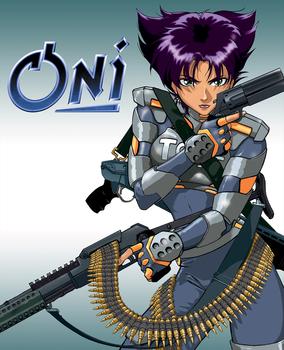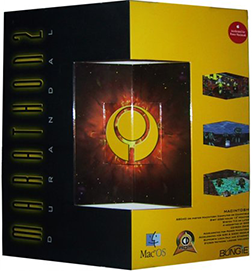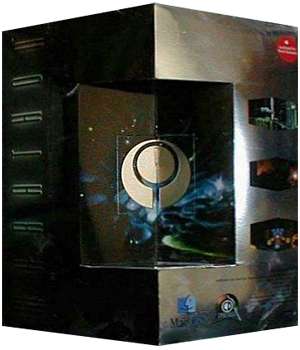Related Research Articles

Myth is a series of real-time tactics video games for Microsoft Windows and Mac OS. There are three main games in the series: Myth: The Fallen Lords (1997), Myth II: Soulblighter (1998), and Myth III: The Wolf Age (2001). The Fallen Lords was developed by Bungie, and published by Bungie in North America and Eidos Interactive in Europe. Soulblighter was also developed by Bungie, and was published by Bungie in North America and GT Interactive in Europe. The Wolf Age was developed by MumboJumbo, and co-published by Take-Two Interactive and Gathering of Developers for Windows and by Take-Two and MacSoft for Mac.

The Marathon Trilogy is a science fiction first-person shooter video game series from Bungie, originally released for the Classic Mac OS. The name of the series is derived from the giant interstellar colony ship that provides the main setting for the first game; the ship is constructed out of the Martian moon Deimos. The series is often regarded as a spiritual predecessor of Bungie's Halo series.

Halo: Combat Evolved is a 2001 first-person shooter video game developed by Bungie and published by Microsoft Game Studios for the Xbox. It was released as a launch game for Microsoft's Xbox video game console on November 15, 2001. The game was ported to Microsoft Windows and Mac OS X in 2003. It was later released as a downloadable Xbox Original for the Xbox 360. Halo is set in the twenty-sixth century, with the player assuming the role of the Master Chief, a cybernetically enhanced supersoldier. The Chief is accompanied by Cortana, an artificial intelligence. Players battle aliens as they attempt to uncover the secrets of the eponymous Halo, a ring-shaped artificial world.

Pathways into Darkness is a first-person shooter adventure video game developed and published by Bungie in 1993, for Macintosh personal computers. Players assume the role of a Special Forces soldier who must stop a powerful, godlike being from awakening and destroying the world. Players solve puzzles and defeat enemies to unlock parts of a pyramid where the god sleeps; the game's ending changes depending on player actions.

Halo 2 is a 2004 first-person shooter game developed by Bungie and published by Microsoft Game Studios for the Xbox console. Halo 2 is the second installment in the Halo franchise and the sequel to 2001's critically acclaimed Halo: Combat Evolved. The game features new weapons, enemies, and vehicles, another player character, and shipped with online multiplayer via Microsoft's Xbox Live service. In Halo 2's story mode, the player assumes the roles of the human Master Chief and alien Arbiter in a 26th-century conflict between the United Nations Space Command, the genocidal Covenant, and later, the parasitic Flood.

Oni is a third-person action video game developed by Bungie West, a division of Bungie. It was originally released by Gathering of Developers for Microsoft Windows and Mac OS in 2001; a PlayStation 2 port developed by Rockstar Canada was released the same year. It was Bungie West's only game. Gameplay consists of third-person shooting with hand-to-hand combat, with a focus on the latter. The game's style was largely inspired by Ghost in the Shell and Akira and shares the same genre, being set in a cyberpunk world.

Myth: The Fallen Lords is a 1997 real-time tactics video game developed by Bungie for Windows and Mac OS. Released in November 1997 in North America and in February 1998 in Europe, the game was published by Bungie in North America and by Eidos Interactive in Europe. At the time, Bungie was known primarily as developers of Mac games, and The Fallen Lords was the first game they had developed and released simultaneously for both PC and Mac. It is the first game in the Myth series, which also includes a sequel, Myth II: Soulblighter, set sixty years after the events of the first game, also developed by Bungie, and a prequel, Myth III: The Wolf Age, set one thousand years prior to the events depicted in The Fallen Lords, and developed by MumboJumbo.
Halo 3 is a 2007 first-person shooter video game developed by Bungie for the Xbox 360 console. The third installment in the Halo franchise following Halo: Combat Evolved (2001) and Halo 2 (2004), the game's story centers on the interstellar war between 26th-century humanity, a collection of alien races known as the Covenant, and the alien parasite known as the Flood. The player assumes the role of the Master Chief, a cybernetically enhanced supersoldier, as he battles the Covenant and the Flood. In cooperative play, other human players assume the role of allied alien soldiers. The game features vehicles, weapons, and gameplay elements familiar and new to the series, as well as the addition of saved gameplay films, file sharing, and the Forge map editor—a utility which allows the player to perform modifications to multiplayer levels.

Myth II: Soulblighter is a 1998 real-time tactics video game developed by Bungie for Windows and Mac OS. Published by Bungie in North America and by GT Interactive in Europe, the game was also ported to Linux by Loki Entertainment. It is the second game in the Myth series, and a sequel to Myth: The Fallen Lords. In 1999, an expansion pack, Myth II: Chimera, was released. Developed by the Badlands mapmaking group, in association with Bungie, Chimera is set ten years after Soulblighter. Originally released as a free download, Chimera was later published by Bungie as part of the Total Codex bundle, incorporating it into the official Myth canon. In 2001, a third Myth game was released, Myth III: The Wolf Age, set one thousand years prior to The Fallen Lords, and developed by MumboJumbo.
Double Aught was a software company founded by several former members of the Bungie team. Founding the company was Greg Kirkpatrick, Chris Geisel, Jihan Kim, Randy Reddig, Colin Kawakami and David Longo. The company was formed in Brooklyn prior to the 1996, release of Marathon Infinity, the third release in the Marathon trilogy of video games.

Alexander Seropian is an American video game developer, one of the initial founders and later president of Bungie, the developer of the Marathon, Myth, and Halo video game series. Seropian became interested in computer programming in college and teamed up with fellow student Jason Jones to publish Jones's game Minotaur: The Labyrinths of Crete. The two became partners, and Bungie grew to become the best-known Apple Macintosh game developer before being bought by Microsoft in 2001.

Marathon 2: Durandal is a first-person shooter video game, part of the science fiction Marathon Trilogy by Bungie. It was released on November 24, 1995. The game is mostly set on the fictional planet of Lh'owon, homeworld of the S'pht, and once again the player takes the role of a shipboard security officer from the Marathon. This is the only game in the series to be officially released for Windows and Xbox 360 XBLA in addition to the Mac. The unofficial Aleph One community enhancement, built on engine source opened by Bungie in 1999, allows the game to be played on many other platforms. The entire game including assets was released for free to the public by Bungie in 2005, now commonly bundled for distribution with Aleph One.

Marathon Infinity is a first-person shooter video game, the third in the science fiction Marathon Trilogy by Bungie. The game was released on October 15, 1996 and included more levels than its predecessor Marathon 2: Durandal. These levels were larger, and formed part of a more intricate plot. Marathon Infinity, unlike Marathon 2, was originally released only for the Apple Macintosh. However, Bungie released the source for Marathon 2 in 1999, allowing the development of the open-source multiplatform Aleph One engine that is also compatible with Infinity. In 2005, Bungie released the trilogy to the public as freeware, allowing the games to be freely downloaded. In 2011, Bungie released the source code for Marathon Infinity itself, preceding an official Aleph One-based port for iOS the next year that is available free.

Marathon is a first-person shooter video game developed and published by Bungie, and released in December 1994 for the Apple Macintosh. The game takes place several centuries into the future in outer space and sets the player as a security officer attempting to stop an alien invasion aboard a colony ship named the Marathon.

Jason Jones is an American video game developer and programmer who co-founded the video game studio Bungie with Alex Seropian in 1991. Jones began programming on Apple computers in high school, assembling a multiplayer game called Minotaur: The Labyrinths of Crete. While attending the University of Chicago, Jones met Seropian and the two formed a partnership to publish Minotaur.

Michael C. Salvatori is an American composer best known for his collaboration with colleague Martin O'Donnell for the soundtracks to the Halo video game series. Salvatori became acquainted with O'Donnell in college; when O'Donnell was given a job offer to score a colleague's film, Salvatori and O'Donnell formed a partnership and eventually created their own production company, TotalAudio. Salvatori continued to manage TotalAudio and worked on his own music for clients such as Disney and Wideload Games.
Excalibur: Morgana's Revenge is a first-person shooter video game developed by ExcaliburWorld Software. The game's development has been closely tied to the Marathon and later Aleph One engines, on which it is based. Most recently, the game was expanded and re-released in 2007 for OS X, Microsoft Windows, and Linux using the open-source Aleph One engine.

A first-person shooter (FPS) is a video game centered on gun fighting and other weapon-based combat seen from a first-person perspective, with the player experiencing the action directly through the eyes of the main character. This genre shares multiple common traits with other shooter games, and in turn falls under the action games category. Since the genre's inception, advanced 3D and pseudo-3D graphics have proven fundamental to allow a reasonable level of immersion in the game world, and this type of game helped pushing technology progressively further, challenging hardware developers worldwide to introduce numerous innovations in the field of graphics processing units. Multiplayer gaming has been an integral part of the experience, and became even more prominent with the diffusion of internet connectivity in recent years.
Bungie, Inc. is an American video game company based in Bellevue, Washington, and a subsidiary of Sony Interactive Entertainment. The company was established in May 1991 by Alex Seropian, who later brought in programmer Jason Jones after publishing Jones's game Minotaur: The Labyrinths of Crete. Originally based in Chicago, Illinois, the company concentrated on Macintosh games during its early years and created two successful video game franchises called Marathon and Myth. An offshoot studio, Bungie West, produced Oni, published in 2001 and owned by Take-Two Interactive, which held a 19.9% ownership stake at the time.
References
- 1 2 Operation: Desert Storm release information at GameFAQs
- ↑ "Operation: Desert Storm". Archived from the original on 1996-10-19. Retrieved 2023-02-20.
- ↑ Marathon Scrapbook, pages 1-2. From the Marathon Trilogy Box Set, Bungie, 1997.
- ↑ Peterson, Kim (November 8, 2004). "Halo effect" . The Seattle Times . p. E1. Retrieved July 4, 2023.
- ↑ "1up description". Archived from the original on 2009-03-25. Retrieved 2010-04-29.